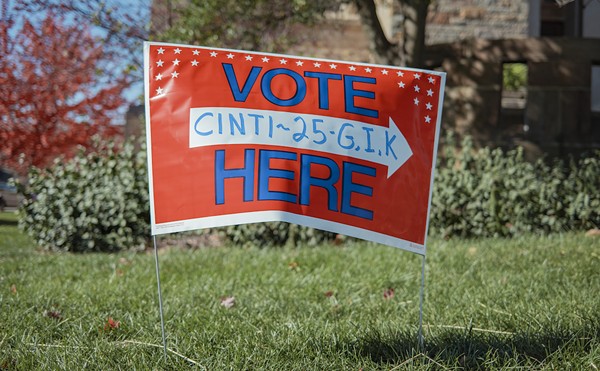An area civic group will launch a series of public meetings this week to examine the city of Cincinnati’s ever-growing Police Department budget and help residents make informed decisions about whether some cuts can be made.
Citizens for Civic Renewal (CCR) will conduct open discussions with a panel of experts followed by several town meetings during the next two months. When the process is complete, the group will present its findings in a formal brief to the city manager’s office and City Council this fall.
Dan Hurley, host of Newsmakers on WKRC-TV (Channel 12), will act as moderator to the panel of experts that includes University of Cincinnati criminology professor John Eck; Iris Roley, a board member with the NAACP’s local chapter; West Side activist Pete Witte; and Lesley Jones, director of the Cincinnati Human Relations Commission.
CCR director Jeffrey Stec says the group will delve into the police budget that currently costs $148.9 million annually, essentially one-third of the city’s total operating budget.
Questions posed by citizens during the meetings ultimately will serve to frame their final report. The group’s intent is not to micromanage the police, he adds, but instead to establish positive operating practices acceptable to both the public and the department while reducing costs.
“We sort of blindly look at public safety as something that is sacrosanct and not put it through the paces of how do we get the most out of our money, how do we be more creative about the dollars we spend and the key is we are absolutely not asking ourselves to take more risks with our police dollars,” Stec says. “I don’t want to be less safe, but the question is, ‘Right now are we measuring safety based only on the amount of money we spend.’ ”
Although Cincinnati lost 8 percent of its population from 1990 to 2010, it has increased its police force by 21 percent during the same period. As a result, Cincinnati ranks at or near the top on a list of police officers per 100,000 residents in similarly sized cities, depending on how calculated.
Cincinnati’s current municipal budget deficit stands at roughly $17 million and is likely to increase. Councilwoman Laure Quinlivan says the budget will have to be readjusted this summer, but she plans to review the police budget during during an upcoming finance committee meeting.
From 2003-07, the city added approximately 120 officers, costing the city $57 million including salaries and benefits. The push for more cops came in the form of a City Council directive, not a request from then-Police Chief Thomas Streicher Jr., who opposed the idea of adding numbers to the force.
From 2000-10, the police and fire budgets both grew by more than 30 percent while all other department spending declined, Quinlivan notes.
“Since 2005, the violent crime rate has gone down significantly in our city,” she says. The police chief will tell you the reason is not because they
have more officers; the reason is they have learned how to use technology. The thing that makes the difference and has made the difference in reducing our crime rate is smarter policing and not more bodies.”
On the city’s West Side, Witte says public safety ranks as the top concern among residents, but they want to know exactly what they’re getting if they preserve police spending. A void exists when it comes to the police disclosing certain performance data to the public, which oftentimes isn’t even tracked, he adds.
For the discussions to be effective, city leaders, the Police Department and neighborhood groups must match up priorities in terms of spending, Witte adds.
But he holds little hope for citizen engagement, which played little to no role during last year’s budgeting process where council allowed residents to speak for two minutes, then ultimately bypassed every suggestion.
“This is a good thing to do and I’m certainly going to keep participating and I’m going to try to get other to participate as well,” Witte says about the upcoming process. “My fear is the downside is that we will be pretty much ignored by City Council.”
Stec is more optimistic and wants the
process to create a “passionate neutrality” — a safe haven where citizens can convene to discuss important issues. Citizens need to come together, learn the facts, consider their options and make tough but equitable choices when it comes to spending, he adds.
“I don’t know if it’s American culture or it’s all over the planet, but by and large we don’t take enough time to think about what the right question is, and the question that’s asked is what biases the entire conversation,” Stec says.
“That’s what this panel discussion is all about: What questions do we really want to answer as a community about policing.”
MEETING SCHEDULE:
• April 19, 7-8:30 p.m.
Media Bridges, 1100 Race St., Over-the-Rhine, across from the SCPA
• April 20, 7-8:30 p.m.
Aquarius Star, 329 Ludlow Ave., Clifton, across from Graeter’s
• April 25, 7-8:30 p.m.
Madisonville Recreation Center, 5320 Stewart Ave.
• April 26, 7-8:30 p.m.
Westwood Town Hall, 3017 Harrison Ave.
• April 27, 6-7:30 p.m.
Downtown Public Library, 800 Vine St.
• May 5, 6-7:30 p.m.
Corryville Recreation Center, 2823 Eden Ave.
• May 7, 10 a.m.-Noon
College Hill Recreation Center, 5545 Belmont Ave.





